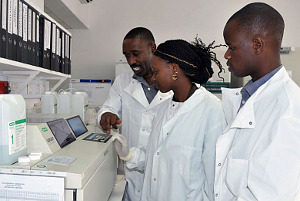African genomes yield sickle cell insights

In African-American populations genetic variations can influence the ability to produce foetal haemoglobin by as much as 50 per cent, but knowledge of this effect in East African populations is scant. A collaboration between research teams in Tanzania and the UK applied the power of the genome-wide association techniques to the genomes of 1,213 individuals in Tanzania to confirm whether or not the same variations are at work in an East African population and to identify possible new ones.
Sickle cell anaemia is painful and disabling disease caused by variations in a gene involved in producing adult haemoglobin. But people who have greater levels of the foetal form of haemoglobin in their bloodstream are less affected. This first large-scale genomic study based in Tanzania has revealed a number of regions in the genome that appear to have an effect on foetal haemoglobin levels and will guide future research into African populations.
“By carrying out a large-scale genome-wide association study we have, for the first time, been able to identify powerfully the prevalence of genetic variants involved in sickle cell anaemia in the Tanzanian population and how that compares with other populations. We have also identified suggestive additional variants, which can now be studied further by the research community in the search for interventions for sickle cell anaemia in patients in Africa and worldwide.”
Siana Nkya Mtatiro Co-first author of the paper from Muhimbili University of Health and Allied Sciences
The research confirmed the association of genetic variations near the genes BCL11A and HBS1L-MYB with sickle cell anaemia in the Tanzanian population but found that variations in HBB, which are associated with the disease in African-American populations, are not significant in East African populations. In addition, the study hinted at additional associations that require confirmation in other populations.
“We were unable to validate any of our new suggestive associations in a group of UK samples we used for comparison. This suggests we need bigger studies to more completely understand the genetics of this disorder.”
Jeff Barrett Senior author from the Wellcome Trust Sanger Institute
The work was a joint effort drawing on the skills and techniques developed by Tanzania- and UK-based teams and the free flow of information between them. The samples were gathered in Tanzania and genotyped at the Sanger Institute, the genome-wide scan was carried out by the UK-based team and subsequent data analysis was carried out the African-based researchers.
“This work demonstrates how scientists in Africa can collaborate both with one another and with colleagues in Europe to provide greater insight into the genomic landscape of health and disease in Africa, the cradle of humanity. We hope that our approach could be used as a model for other researchers working to understand the genetic basis of health and disease in Africa.”
Julie Makani Senior author on the study from Muhimbili University of Health and Allied Sciences
The research was supported by the Wellcome Trust, which encourages collaborations between researchers on different continents to apply cutting-edge genomic techniques in low- to middle- income countries. Trust-funded research in this area aims to increase our understanding of diseases that might otherwise be neglected.
“This is an important contribution to sickle cell disease research, which clearly demonstrates how successful genomics research collaborations – in this case between researchers in Tanzania and the Wellcome Trust Sanger Institute – can be achieved. The results of this study will form a firm foundation for further studies of the genetic basis for sickle cell disease and potential avenues for treatment in sub-Saharan Africa.”
Jimmy Whitworth Head of Population Health at the Wellcome Trust
More information
Publications:
Selected websites
Muhimbili University of Health and Allied Science
Muhimbili University of Health and Allied Science is a centre of excellence for training health professionals, quality research and public service. Its proximity to and collaboration with the Muhimbili National Hospital provides a unique advantage in ensuring the research translates directly to practice. It is dedicated to providing quality training, research and service in health and related fields for attainment of equitable socio-economic development of the Tanzania community and beyond.
The Wellcome Trust Sanger Institute
The Wellcome Trust Sanger Institute is one of the world’s leading genome centres. Through its ability to conduct research at scale, it is able to engage in bold and long-term exploratory projects that are designed to influence and empower medical science globally. Institute research findings, generated through its own research programmes and through its leading role in international consortia, are being used to develop new diagnostics and treatments for human disease.
The Wellcome Trust
The Wellcome Trust is a global charitable foundation dedicated to achieving extraordinary improvements in human and animal health. We support the brightest minds in biomedical research and the medical humanities. Our breadth of support includes public engagement, education and the application of research to improve health. We are independent of both political and commercial interests.


